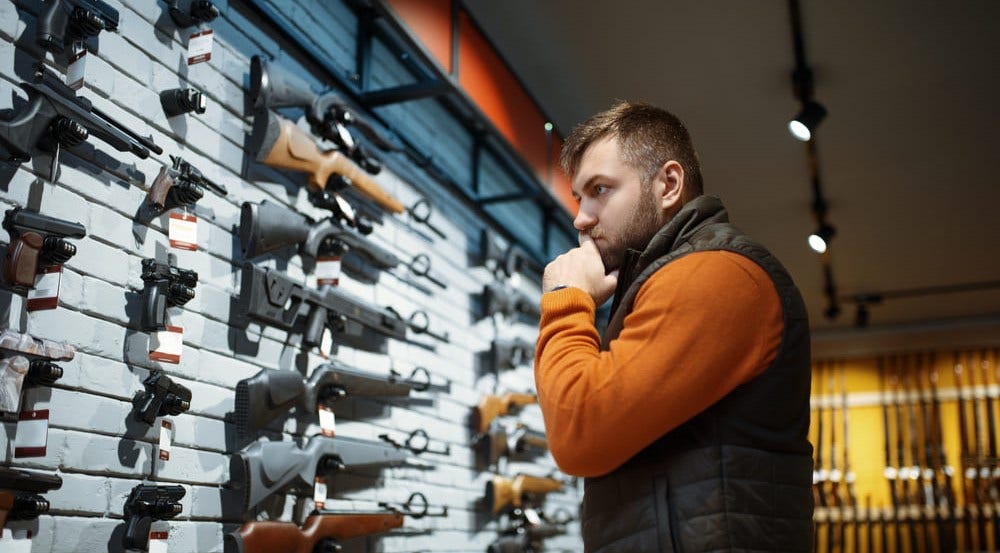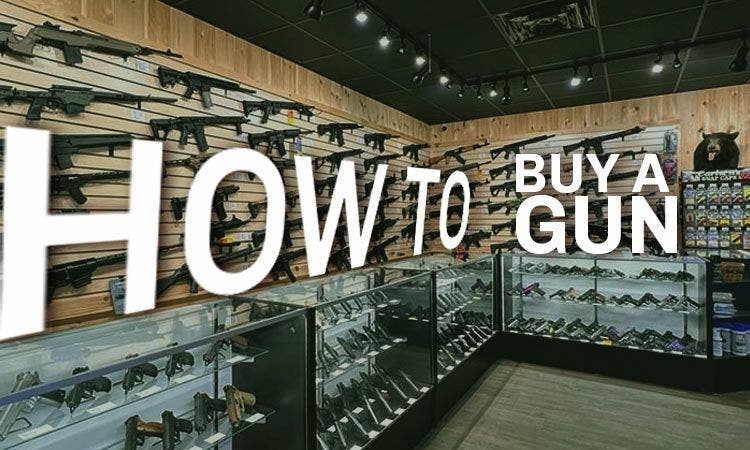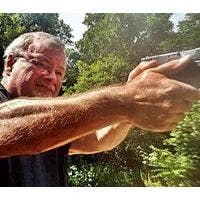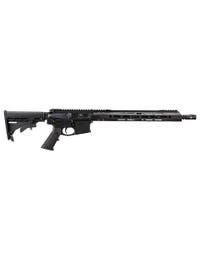“With the pandemic hopefully behind us, maybe gun sales will level off now”, a good friend opined to me one day when I was in my good buddy’s gun shop. “Hopefully we’ll be able to find some good buys that won’t require a second mortgage”, he said. He had a point… the NSSF says that 5.4 million new shooters bought guns in 2021, one in five households. That’s a bunch. Manufacturers were hard-pressed to keep up. Those days are behind us now, but the supply still hasn’t totally caught up with demand.
So, what’s this got to do with buying a gun? My point is that, if you are in the market for a gun, you might have to modify your expectations. We will look at all the basic types of guns and their purposes herein so that if you may not find the exact gun you want, you’ll have a good idea of what else would work for your needs.
What if you’ve never bought one before but are wanting to change that? What type of gun do you need? How do you go about buying a gun? What laws are involved? Can you legally buy one from your cousin? We’ll look into all of this. It sure isn’t like buying a cordless drill – there are laws governing gun sales that you may not know about. I will attempt to answer these questions, and more, in this article.

Glossary Of Common Shooting Terms
Before we get into the types of guns available for purchase, let me include a simple glossary of some common shooting terms … you know, those acronyms and words that experienced (and some not-so-experienced) shooter tend to throw around. Sometimes, they actually know what they’re talking about…
Bullet: The thing that comes out of the barrel. Not to be confused with cartridge, which consists of the case, primer, powder and bullet. Correct usage: “Hand me three cartridges, please?”. Incorrect: “Hand me three bullets, please?” The bullets are in the cartridges. This is a common error and one that’s easily fixed. As a reloader, I could hand you three bullets, or three cartridges… they are different. The point is not to be snobby, but to simply define what you mean. You should use the right words so that experienced shooters know exactly what you mean.
Caliber: The designation of the bullet’s diameter in either inches or metric terminology. Calibers are not interchangeable, with a couple of exceptions. You must shoot the caliber designated for the gun and not do otherwise. Exceptions… in guns chambered for .357 Magnum and .44 Magnum, you may shoot the .38 Special and .44 Special cartridges. Don’t try to shoot .380 in a 9mm gun, or .40 S&W in a 10mm unless you have those specific barrels. Also, do not shoot .22LR in a .22 Magnum cylinder. All of these examples are different sizes and bad things can happen when they’re fired in other-caliber chambers.
Carbine: Typically, a short-barreled rifle. Barrels for carbines tend to run around 16-18 inches or so.
DA/SA: Double-action and single-action in one gun
FTE: Failure to extract. When a gun, usually a semi-auto, fails to extract the fired case
FTF: Failure to feed. Again, typically found in semi-autos when the slide fails to pick up and load the next round from the magazine.
Pistol: Generally, a semi-auto handgun. Revolvers are different and are (again, in general) not usually referred to as pistols.
Pump: Gun action that is actuated by sliding a movable forearm connected to action bars on a shotgun or rifle to the rear, thereby ejecting the fired case and loading a fresh cartridge. This type of gun can be fired as fast as you can “pump” the sliding forearm.
Semi-Auto: Semi-automatic operating system whereby when the gun is fired, the fired cartridge case or shell moves the slide to the rear and is ejected. A new cartridge is picked up from the magazine and is loaded in the chamber, ready to fire again. This system allows firing one bullet at a time as fast as you can pull the trigger. (Note that this system is NOT a full-auto system where multiple bullets are fired with one trigger press. The media gets this wrong every time).
Wheelgun: A nickname for revolver
Which Gun Should You Buy?
Being a freelance gun writer, I get asked for advice fairly regularly. The question I hear the most is “what gun should I buy”? I have a few opinions about that, but before I launch into the spiel, I always ask them why they are buying a gun, and what do they want to do with it. Usually, the answer involves self- or home protection, but not always. Let’s look at some general guidelines about which type of gun serves each of the following purposes best. As with everything else concerning guns, there are overlaps. Here we go…

What To Buy?
This topic covers a lot of territory. Are you talking about concealed carry? How about a gun for your truck or car? (I won’t cover this in detail, because it’s pretty self-explanatory. Where legal, just carry what fits in your vehicle that you are proficient with). Home defense? There is a lot of leeway here. We’ll break it down a bit further.
Concealed Carry: If you are an experienced shooter, you could carry whatever type of handgun you do best with. For a beginner, I would say to try both semi-autos and revolvers and then make an informed decision. Bear in mind that if you just buy a gun and then never practice or train with it, you are pretty much wasting your money. See which of the two types you hit best with. For some, it will be a semi-auto, while other folks tend to do better with a revolver. There are tons of each type out there, so choose what you are comfortable with and what you get the most hits on target with. As for caliber, again try out several. Again, you should settle on the gun and caliber that you score the most hits with. Don’t let anyone tell you that whatever caliber you choose is not good for defense. Pick what you hit the best with. The saying “a hit from a .22 is better than five misses from a .45” has merit. Go shooting with a buddy or go to a range and rent different guns. That’s the best way to determine what works best for you.
Home Defense: This area tends to open up your possible choices to long guns, unlike concealed carry. You should select a gun for home defense that best fits your situation. I’ve mentioned that we live out, not in a suburb, apartment, city or neighborhood so our needs would be different from someone else’s who live in close proximity to others. The thing you have to take into account when taking a shot at an intruder at home is penetration.
Over-penetration can do a lot of damage and could result in you accidentally shooting a member of your family or your neighbor. Some think “I’ll just get a 12-gauge… you don’t have to aim that!”. Not so fast. You DO have to aim, especially at the close ranges you’ll find in your home. Shooting a load of buck or other shot at under 7 yards will drill one big hole in your wall or whatever. There will be close to zero spread – it takes a ways to allow the shot to start spreading. So, understand that before you buy.
You might be better off with a handgun with a light attached, if you are proficient with one. If the home you are protecting involves open spaces, a rifle makes sense. What type of rifle is up to you, but something that is handy and gets into action quickly works best. I have several rifles and various handguns. Where we live, I like the 9mm carbine. But, that’s me. Your situation will be different, so try some different guns out before you buy.
Other: Other purposes for firearms might include hunting, competition and plinking. These (except for plinking) are pretty specialized and are beyond the scope of this article. There are other articles and videos out there that cover these topics; if you have specific questions, you could ask them below. Plinking will be enjoyed by shooting whatever type of gun you own, but typically a .22LR of some type is used. Fun is the name of the game!
Laws Governing Gun Sales
Form 4473
You went to your local gun shop, picked out a gun and plunked your money down. Now what? Each state has different laws governing gun sales, so I won’t get into that too much, but I will tell you about federal requirements. If you buy a gun from an FFL (Federal Firearms License) holder, you will fill out an ATF Form 4473. That is basically a background check form that gets called in (or digitally sent) to the Bureau of Alcohol, Tobacco and Firearms. If approved, you walk out with your gun (unless your state has other ideas, such as a waiting period). That’s about it. If you are denied, you have the right to appeal… here’s the FBI form that does that.
How Old Must I Be to Buy A Gun?
To buy long guns and ammo for them, you must be 18. Handgun purchasers need to be 21. It’s explained pretty well right here. Know that states have the right to raise the required age, but cannot lower it.
My Buddy Wants To Sell Me His Pistol – What Do I Do?
As long as you are of legal age and both live in the same state, give him the dough he wants and walk away. You are not required to keep records of sales that are not purchased through an FFL.
But… if you buy a gun in a state that you don’t live in (whether from an FFL or private sale), you need to have a local FFL holder send the gun to your state and then you must pick it up at your home FFL. You fill out the form, just like any other gun sale. Of course, you can buy privately and not do this but you may run afoul of the law. It’s better to err on the side of caution where buying and selling guns are concerned. Here’s a great summary of Federal firearms laws for private sales.
States Have Different Laws
As I stated above, every state is different in its approach to gun laws. Liberal states tend to have more onerous rules in terms of purchase and carry permits, waiting periods, magazine limits, etc. than do conservative states. Here is the most up-to-date information I could find on gun laws in all 50 states. I looked at several sources but this seems to be the latest info. (The test I used to find up-to-date info concerned my home state of Indiana. Just this summer, constitutional carry was passed so no permit is needed to carry handguns. This source had that info correct, unlike other sources I checked).
Where To Buy Guns
OK, so we’re up on the different types of guns and the basic laws governing sales. Now… where exactly can you buy guns? There are a few options (three, I reckon)...
FFL
Go to your local gun store, whether it’s a mom-and-pop setup or a big box store. They are set up to not only sell you a gun or two but to also have the necessary ammo and other related accesories that will make your new gun easier and more fun to shoot. Be ready to fill out ATF Form 4473 (plus any additional forms your state requires). This is, to my mind, the best and most fun way to buy a gun because (even though you are just positive you know what you want), there are other guns to look at and drool over.
Online
Many people are surprised that you can buy guns online completely legally! In fact, that is what Bear Creek Arsenal has been doing for a decade. Buying online is a phenomenal way to get better deals and find exactly what you want instead of solely relying on the stock of your local gun store
So why not try it? Now, sit back and wait for the rifle to make its way to your ranch… make some coffee, please…
Not so fast, there, buckaroo. The rifle ain’t coming to your house. You provided, when you gave your info, the name and address of your local FFL dealer. The gun will go there. After it arrives, you will go to the store, fill out the ubiquitous 4473 form, and THEN take the gun back to the ranch.
Your dealer may or may not charge you a nominal transfer fee. Some do, and some don’t. If you buy from a company like Rural King (here in Indiana), they waive the fee if you have the gun shipped to your local RK store. Others may not do that. Anyway, that’s the bare bones of buying online. It is very simple, but you gotta follow the rules.
Private Sale
The last way to buy a gun that we will examine is the private sale. I touched on this above. If you sell a gun to a resident of your state, there are no records to keep or other legal hoops to jump through provided the buyer is of age and legally able to own a gun (you’d better be sure that he or she is not on some type of watch list or is otherwise not able to legally buy a firearm. I would never sell a gun to someone I didn’t know pretty well).
There are legalities, however, if you cross state lines to buy or sell a gun to an individual. Again, I mentioned them above. You will need to involve an FFL dealer in the process if you want to follow the law. And again, make sure the person buying your gun is of legal age and is cleared to own firearms.
No matter how you buy your gun – FFL, online or private sale – just follow the rules and you should be good to go.

Tips For First-Time Gun Owners
I will finish up this buying guide with some tips for prospective gun owners. There are not many, but a few are worth mentioning.
I won’t turn this into a “What To Look For In A Used Gun” article – that has been covered many times, in many articles and videos. I will assume you’ve sought the advice of your local FFL guy or gal, a shooting buddy you trust, or other expert. You have selected, purchased and now own that rifle, pistol, or shotgun and suitable ammo.
What now? You’re standing there holding this inert piece of firearm technology and are wondering where to go from here. Let’s look at a couple of things you might explore doing.
Get Training
New owners need to get training that deals with safe handling, shooting, cleaning, etc. I don’t mean your cousin, who owns a zillion guns and will gladly “teach you to shoot”... I’m talking about going to an NRA-approved course with a licensed instructor. Most locales have access to this type of training. You will be miles ahead of the game if you sign up, pay for, and attend a course for beginning shooters. Bear Creek Arsenal's blog has a ton of articles to help out new shooters as well, like this one about how to clean a gun.
Practice
Here’s where the rubber meets the road. Buying the latest-and-greatest pistol in the world and a whole lot of ammo won’t do you any good unless you actually load the gun and fire it. This is the same analogy that a friend used to tell her mother who hated taking meds… just rubbing the pill bottle won’t make you better. Load up a magazine or cylinder and let fly! Go to a local range (combine it with training) or another venue that allows loud noises and bullets flying around. Just be safe, which leads me to the next tip…
Safety
Safety should be the watchword from the moment you took possession of that gun. Here's an important article on gun safety, penned by yours truly. The main-most rule for any new gun owner is to assume that the gun is loaded all the time. That way, you won’t have an accidental or negligent discharge if you keep your finger away from the trigger. You should get good at this safety thing or you shouldn’t own a gun. Period.
Your “Gun Society”
OK, you ask what in the world is a Gun Society? My last tip involves getting to know other shooters, going shooting with them, maybe doing a bit of socializing… you know, surround yourself with people who have a similar interest in shooting. You might expand your circle to include reloaders if you get into this shooting sport. Some of the best advice I’ve been given over the five decades or so that I’ve been shooting has been given to me by other shooters that I’d befriended and went shooting with.
Don’t discount that old guy over there with the M1 Garand, or the other fellow shooting cast bullet reloads in his .308. They can be a fount of knowledge. One specific tip I got from a shooter who had “been there” was a quick, cheap way to remove leading from a handgun barrel… use pieces of Chore Boy copper dish pads wrapped around a brass bore brush. Works like a charm, and I have him to thank for the tip.
In Summary
New gun ownership is exciting! Even with all the guns I own (or have owned over the years), I still get that “new gun feeling” when I walk away from my friend’s gun shop with a new acquisition. Gun ownership has grown greatly in recent years, which is good for the sport.
We shooters like to welcome new ones to the fold, and we want you to be successful. If you have specific questions, please chime in below and I’ll get back to you. Thanks for reading this, and now… it’s time to go shooting!









